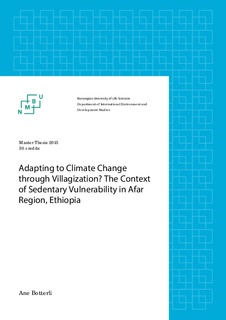| dc.description.abstract | Climate change is considered a threat to global and local stability with high uncertainty regarding how these trends will affect natural resources, and the livelihoods and national economies that dependent on them. The adaptive capacity of pastoral livelihoods in the dry lowlands of Afar, is increasingly compromised though deteriorating natural resources, and socio-political processes increase vulnerability trough compromising local coping- and adaptation capacity. The objective of this thesis is to critically assess the assumption that villagization, as an adaptation strategy to climate change, will improve pastoral adaptive capacity and reduce vulnerability. This will be done through an investigating the key drivers of vulnerability and how these have been affected by villagization, in addition to applying five the principles of the Sustainable Adaptation Framework to assess the ability for villagization to provide stainable development pathways.
This qualitative study follows an inductive scientific method. Data was collected through a non-probability sampling strategy and accumulated from mainly semi-structured interviews and participatory observation during 3 months of fieldwork in an Afar village in Ethiopia.
Villagization increase sedentary vulnerability by compromising certain exciting adaptation strategies. These strategies include flexible herding of livestock and social exchange mechanisms. Food insecurity has increased after villagization as a result of decreasing livestock and lack of agricultural yields. In addition to food insecurity, decreasing livestock leads to change in diets and nutritional intake which causes deteriorating health. However, villagization has also benefitted sedentary pastoralists through increased services and infrastructure which can improve adaptive capacity. In order to increase adaptive capacity and reduce vulnerability, the villagization must incorporate an understanding of the vulnerability context. Participation of local and marginalized stakeholders is necessary to achieve further positive outcomes. The premise of top down agricultural expansion embedded in Villagization further prevents sustainable pastoral pathways, but committing to a Sustainable Adaptation Framework will improve the exciting sedentary conditions. And the framework is promoted to guide national development pathways. | nb_NO |
